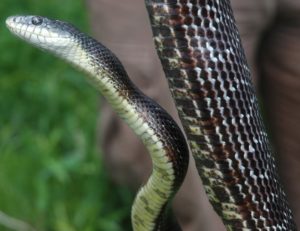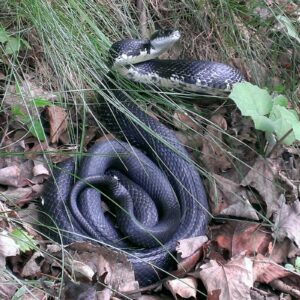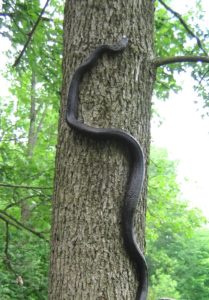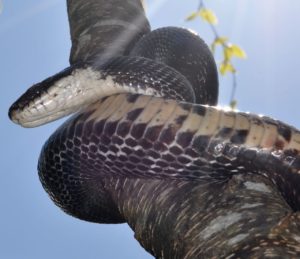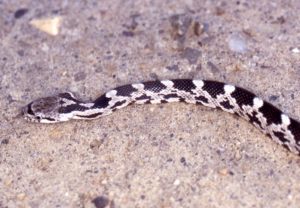Pantherophis alleghaniensis
Identification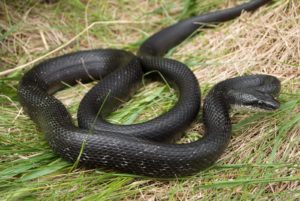
The adult Central Ratsnake is black, but usually shows remnants of its juvenile blotched pattern and some flecks of white between the scales. The underside is white under the chin and throat. This changes to a black and white checkerboard pattern as you move toward the tail and then finally turns to a solid dark color under the tail. The ratsnake has weakly keeled scales. Adults may be 5-6 feet long (the longest documented in Vermont is 75 inches).
Young Central Ratsnakes under 20 inches long have a pattern similar to Eastern Milksnakes, but they do not have the white “Y” on the back of the head that milksnakes have. In addition, the blotches on the young Central Ratsnakes have slightly extended corners so that they are more “H” shaped, rather than round. By the time ratsnakes reach three feet in length they are mostly black. Adult North American Racers (also black as adults) are solid black with a solid white or gray belly.
Get more detailed identification and life history information by downloading the chart here.
You can learn more about this species and see some video footage by checking out this clip from our Rattlers, Peepers & Snappers DVD.
Range/Habitat
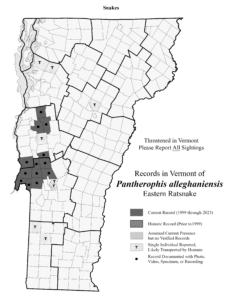
[ click image to zoom | download printable PDF ]

[ click image to zoom | download printable PDF ]
The Central Ratsnake is typically found in and around old buildings, old fields, and edges near rocky areas and ledges.
Status
This species has a state natural heritage rank of S2 (rare). The Central Ratsnake has been designated a Species of Greatest Conservation Need (high priority) in Vermont’s Wildlife Action Plan and is threatened in Vermont. Please report all sightings of this species in Vermont. Take photos if possible. Even historic sighting information is useful.
Additional Photos
More Info
E. alleghaniensis used to be called E. obsoleta. In 2007, the scientific named changed from Elaphe alleghaniensis to Pantherophis alleghaniensis. In 2025, the common name changed from Eastern Ratsnake to Central Ratsnake.
- Pantherophis obsoletus at the Animal Diversity website
- Pantherophis alleghaniensis in the Vermont Agency of Natural Resources’ Wildlife Action Plan: Amphibian & Reptiles (9/25/2015 draft)
- Pantherophis alleghaniensis at the Snakes of Massachusetts website
- Pantherophis alleghaniensis Department of Defense PARC Species Profile Video
Species summary written by Ariel K. McK. Burgess.

